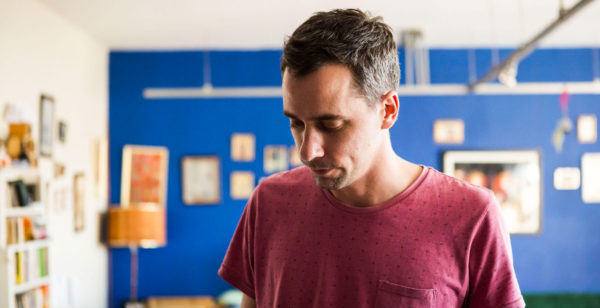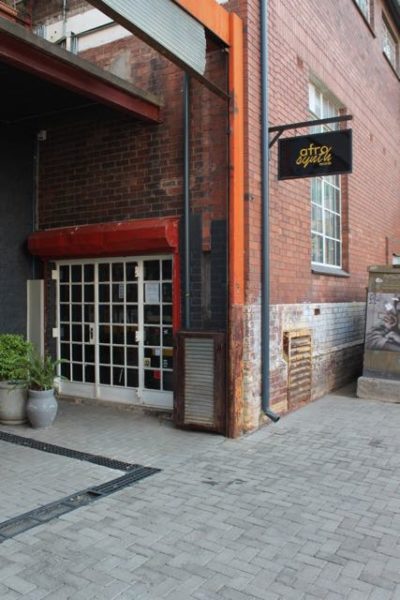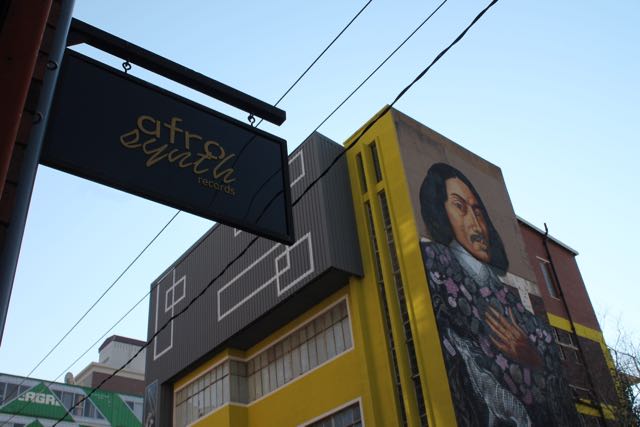I have to tune the car radio manually to get to the place I want to be on Cape Town’s FM bandwidth. The seek button scans over the desired channel even though I’m just a few blocks away from the broadcasting headquarters. Immediately, the old, but familiar hiss of white noise transports me back to my youth and then it pops into life as I get to 89.5. A two-step punchy snare and a syllabic yelping in Zulu greets me on the other side, this sounds more like home.
“You have to listen to Bush Radio” a friend told me the night before, “if you want to hear South African music”. For the past week I’ve been driving around my hometown listening to the ubiquitous sounds of popular music from Europe and USA proliferated by the nationally syndicated stations like 5FM. This has always been the case in South Africa and notwithstanding the community focussed programming from small, inconspicuous stations like Bush Radio, this has remained the broadcasting practise for the most part of my adult life too.
Every time I return to South Africa I’m always astounded and dismayed how very little has changed in that regard, even when in Europe, South African music is being proliferated by DJs and radio everywhere. The sound of GQOM, the band BCUC, a revival of seventies era Fusion, and the newfound interest in the eighties bubblegum sound had all been largely instigated and promoted through European labels and record stores in recent years.
Limited by constricts like the lack of vinyl presses to re-issue music and the fact that most of the original records are harboured in European record collections, it’s obvious why this has happened, but it doesn’t look set to remain this way for much longer. In recent years a DJ, a blog, a label and a record store has come along, all dedicated to changing this, bringing South African music back home and making availeable on the vinyl format again. It all funnels down to one man, Dave Durbach, better known by his DJ alias Okapi, who is tirelessly and selflessly, collecting and re-distributing this music through Afro-Synth, a blog, store and record label dedicated to new and forgotten South African music.
Hailing from Cape Town, where he cut his teeth around the bars and clubs in the small scene around Long Street, playing everything from Hip Hop to Jazz, Dave had always been known as something of a “vinyl junkie” by the locals. At a time when the format was largely forgotten for the more accessible digital formats, Dave would haunt the used record shops in and around Cape Town for obscure records from the eighties. The records largely disregarded as disposable “bubblegum” music by a predominantly white music media, became an obsession for the latent digger in his teens and laid the foundations for what would later become Afro Synth; a blog dedicated to shedding new light on a lost era in South Africa’s rich music history.
Afro Synth garnered attention for its unique and largely untapped source of records from from an apartheid-era South Africa with considered reviews and articles about the artists and the records sound tracking the end of white-minority rule and the first exciting years of post-apartheid South Africa. These were the talented, mostly black artists that remained obscure for the longest time, pressing limited runs of their records on independent labels that were quickly assigned to bargain bins all over SA. He established the blog to highlight these finds and through his words, many South Africans (this writer included) were lead on an extensive journey of discovery through a very niche, and almost forgotten corner of music history.
It immediately caught the attention of an international audience too, in large part due to the enigmatic music at its core, and established Afro Synth as a serious source for diggers with the sounds of Bubblegum, Disco and obscure SA fusion moving way beyond South African borders for the first time, with Okapi’s career as a DJ following close behind.
Through the distributor Rush Hour, he was able to bring that sound to an even bigger audience with a label that has two EPs and two albums under its belt today. Two re-issues from two vastly different eras and sounds, marked the beginning of the label. “Burning Beat” is a slow-burner; a cosmic, Disco track by Roi Music, featuring the vocals of Olive Mashinga, while the second release saw a couple of Kwaito classics from the nineties pressed to vinyl for the first time. The first album on the label came via Ntombi Ndaba, a compilation of a short-lived career, that Afro Synth and Dave are eager to kick-start again in the future while the second album is from a new Cape Town Jazz outfit called Mabuta.
Alongside the label, Dave has also established a shop of the same name in the heart of Johannesburg, and through in-store sessions, his work with Ndaba and Mabuta he’s also cultivating a healthy scene under the Afro-Synth banner. On a recent visit to Cape Town and South Africa, I made Johannesburg a stopover with the central purpose of visiting the Afro Synth store.
Open four days a week, you’ll find Dave in the store whenever he’s not touring as a DJ, playing records and eager to share his musical interests with anybody willing to listen. Music from the label and dedicated African sections take up most of the store, with everything from seventies Progressive Rock from the UK to American Hip Hop dotting the small space. I’m not surprised to hear that it’s these international records that garner the most attention from local audiences, but for the first time in a long time, there’s a dedicated shop and label distributing vinyl of new- and old South African music for South African audiences in South Africa.
As we talk about everything from lost vinyl presses to the next Afro Synth release, it’s clear that Afro-Synth is something very unique and very special in South Africa. It’s providing a newfound interest in this music and even cultivating a scene around it. From the in-store sessions, the releases and his sets, Okapi and Afro Synth are bringing old and new South African records to the fore for foreign-, but more importantly local audiences.

Photo by Oscar O’Ryan
Maybe you can start by filling in a blank for me. When you were still playing at Waiting Room in Cape Town, I remember you were playing everything from Reggae, Hip Hop and Jazz. How did you get into the bubblegum thing and how did it lead to the blog?
Dave Durbach: I started collecting South African records around the same time I started Djing. But at that time in Cape Town there was no interest in SA music so I played soul and funk, hip-hop, electro, ‘lounge’, whatever… The SA records started more as a journalistic interest. I wrote an article for the Sunday Independent in 2008 that included the first few reviews that I used for the blog, which I started a few months later in 2008 when I was living in South Korea. It was only after moving to Joburg in 2009 that I was really able to play these records in public. Over the years since then as my collection has grown I’ve been able to play more local music and less international stuff.
People still refer to you as a “vinyl junkie” from your days playing in Cape Town. Did the Afro Synth blog change the diversity of your buying and collecting habits at all?
I don’t think so, I’ve always just been obsessive about digging for local records and getting as many as possible, at least when they were still cheap. Since I started selling a few years ago I don’t buy so much for my personal collection, in fact a lot of my own collection went into the store. Most of what I buy these days is for the shop, not for me.
Do you feel that you have to live up to the “bubblegum” sound when you are booked to play, or can you still easily modulate to other genres?
I think promoters in Europe expect me to stick to funky South African music so I’m happy to oblige. I might still include some American or British or other African music but that would maybe only be one or two tracks in a set. Playing in Joburg or in Cape Town I have a lot more freedom to play ‘international’ stuff, but the vibe is usually similar. This is my sound. I think my knowledge and collection of bubblegum for example has come at the expense of other genres, especially contemporary ones.
You mentioned when I was in the shop that you don’t get to play in SA that much these days. What is the scene like in South Africa (Johannesburg) at the moment for DJs like you?
Opportunities are very limited for DJs who don’t play house or hip-hop so I don’t get a lot of gigs in SA. There are other DJs in Joburg also playing old local music but they also struggle to get gigs. Kitcheners is the only venue in Joburg that is open to all of us.
You also mentioned that people don’t buy that kind of stuff in the shop. Why do you think South Africans are so reluctant to appreciate the music from home?
For young South Africans this is generally the music of their parent’s generation, so it’s not seen as cool, even kwaito from the 90s. But I think even back in the day bubblegum was looked down on by ‘serious’ music people, of all races. It was too American, too electronic, too fun. Most South Africans grow up with American music as their reference, not local music. The media is largely to blame, particularly the radio.
So when you started picking up the records that you featured on the blog, how and where were you finding the records?
I was still in Cape Town at the time so the first few local records I picked up would’ve come from Revolution Records in Observatory and a place called Vibes in the Atrium in Claremont, which closed down long ago, also Mabu Vinyl, second-hand stores etc.
Have you seen more of these records being picked up as they are finding an audience overseas?
Definitely. A few years ago no one was looking for it so it was super cheap. In recent years there’s obviously been a resurgence in demand for obscure disco from all over the world, particularly from diggers in Europe. The vinyl scene in South Africa is tiny in comparison.
Most of these records came out during apartheid, and were almost lost to music history. Was there ever a political motivation behind the blog?
Yes my main goal has always been to try to preserve this music and the legacy of a generation of musicians who’ve largely been forgotten. I’m also fascinated by its relation to the politics of the time, its role in ultimately defeating apartheid and in doing so promoting some sense of nation-building. The lyrical messages in a lot of songs from that era still carry a lot of weight today, as most of the social problems from that era still persist.
 The way you explained it was that the shop, Afro Synth is very much a labour of love for you. Can you tell me a bit more about what inspired you to start and run the shop?
The way you explained it was that the shop, Afro Synth is very much a labour of love for you. Can you tell me a bit more about what inspired you to start and run the shop?
Initially I was wary of trying to sell records or put a monetary value on them. But more people started contacting me, particularly from overseas, looking to buy records. Over time I managed to find more stock, multiple copies of records, often still sealed. I realised that if I didn’t start buying these up, somebody else would. So I started in 2015 selling on Discogs. Then I realised that these old records shouldn’t all be sold overeas to the highest bidder but South Africans also needed to have access to this music – at an affordable price, not in a foreign currency. I started selling at markets around Joburg then opened the shop in Maboneng in September 2016.
And the label is the first of its kind as far as I know; a South African vinyl label exclusively for South African music. Besides Rush Hour coming on as distributor, what laid the foundation for the label?
That’s about it really! Without Rush Hour’s support I wouldn’t be able to put these records out.
So far it’s been mainly about highlighting forgotten releases like the blog did before it. How did you come across these pieces originally and what is it about music that makes you want to share it with more people?
I’m not necessarily breaking this music by being the first to play it, but where there is demand I am in a position to be able to license and release it in a way where the original artists and labels can benefit. For example the first release Burnin Beat I never owned the original, but there was growing demand for it after DJ Harvey and others started playing it. I know the guys who wrote the song so I was able to license it and find the original master tapes. Re-issuing music makes it affordable to people when the original versions become too rare and far too expensive.
The next release will be the first original release for the label, a Jazz album I believe. Can you tell us a bit more about it and how it might be bridge between the past and the future of music in South Africa?
Mabuta is a band of young South African jazz musicians put together by Shane Cooper, a bass player from Cape Town. It’s rooted in South African jazz but at the same time it’s full of synths and electronics. Some songs go into other parts of Africa – Mali, Nigeria and Ethiopia. It’s a very ambitious project that takes South African jazz into new territory. As a label it’s exciting to be part of a new release by contemporary artists, hopefully there will be more to come.
Besides the GQOM sound – which I’m glad to see is receiving a great reception in SA too – is there anything we should keep our ears pricked for coming through in the near future from the region?
I’m the wrong person to ask about this, I don’t get out much!
I asked specifically because I noticed that a lot of the GQOM stuff is being picked up by foreign labels, in particular. That’s what I like about Afro Synth; it doesn’t just export the sound it motivates a local scene. Is there a future for more labels like Afro Synth to come through and what do you think is needed to nurture more labels like this?
Plenty of other labels are re-issuing South African music from the 80s – labels from Europe, North America and others from SA. There’s so much amazing music that there is room for everyone to try their luck. At the end of the day it’s down to consumers and whether or not a record can sell. Ideally I’m selling albums to create opportunities for artists to get booked to perform again, that’s what I’m working on now with Ntombi Ndaba.

